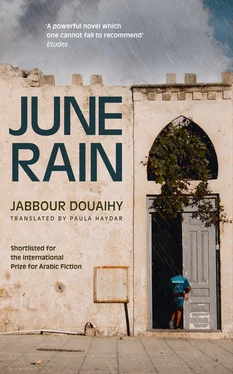He wasn’t satisfied, so he revived the idea of a catapult. Something to cause more damage.
At first he and his brother Francis went looking for some discarded tires. Tires from broken down cars. They removed the inner tube, cut it into long sections and carefully bound them onto a fork of wood like a huge slingshot. They secured it up on one of the rooftops and shouted to everyone to back away. People made futile attempts to stop them.
Hashem launched a hand grenade from it, which exploded in the air on its way to the Lower Quarter. Over on the other side it caused more noise and rumours than anything else.
When they got the 60-mm mortar cannon and along with it an officer — a stranger it was said — to train them how to use it, Hashem was the first conscript. He learned quickly. When the time came to execute, Hashem suggested they wait until people were coming out of the ten-thirty mass on Sunday, the most crowded mass. He volunteered to monitor them on their way into the church. They fired on them on their way out. Hashem was standing behind the cannon, but the shell went too far and landed on the riverbank, setting some dry reeds on fire and hitting a fisherman in the leg.
Hashem got frustrated and started firing the rocket launcher at random targets and at random times of the day and night. He managed to kill some women and children, according to news reports from the Lower Quarter.
But they still weren’t satisfied.
Salimeh’s boys organised two nighttime operations. They amassed their troops and moved stealthily towards the opposing barricades under a cover of gunfire consisting of tracer bullets and exploding bullets. They tried to drive out their enemies from their protected positions, but they didn’t succeed. They had planned ahead of time how they would take them and force them out and how they would divide up the booty, but they failed. Both times they came back with dead and wounded of their own. They weren’t going to win the war and they weren’t going to lose it, either. They had lost their wits, though. They went into the homes of the enemy families in their own neighbourhood and blew up their houses with dynamite; they caused numerous casualties in their own ranks from all the shrapnel that resulted from their lack of expertise in blowing up houses. Then one of them crept into the demolished homes and stole furniture by night so no one would witness his depravity. Those were houses belonging to their enemies who had lived among them, but who’d left temporarily hoping to come back after things calmed down. They blasphemed against the saints and nearly sounded the Muslim call to prayer from the dome of the church just to spite their enemies who had allied themselves with America and the President of the Republic.
They still wanted more, but the ‘revolution’ ended. The president’s term came to an end; the parliament came into session and elected a new president.
The whole thing had been Kamileh’s mother’s idea. Muntaha would never have dared do such a thing on her own. In any case, she had absolutely nothing to do with it. Kamileh’s mother had whispered something in Muntaha’s ear, and at first she didn’t take what she was saying the least bit seriously. She was asking her to go to Fuad and Butros al-Rami, right after the funeral.
The funeral… The sharp smell of sweat… The smell of people, the smell of the dead.
They had brought them in their coffins into the church, against the protests of the families, after a big argument. At first the clergy got involved but no one paid them much attention until the family’s zaeem arrived.
The family’s zaeem … He stopped at each coffin before it was brought into the church. He stopped and bent over each victim, kissed each one on his yellow forehead, and hugged the widow or the children without weeping. He had done all his weeping at home, in the house those same men had pitched in to build for him during hard times. Everyone who had been able to help out, be it with the building or painting or carpentry, had volunteered their labour. He had wept all alone in his room, for a long time, sitting beneath a picture of his uncle, the one from whom he inherited his leadership position. His brother had stood guard outside the door to his room, arguing with anyone who tried to come in.
‘Let him rest. The President of the Republic wants to meet with him!’
His brother said he’d heard him sobbing like a baby. He stayed all alone like that for more than an hour, and then he stifled his sobs and stood up. He changed his clothes, shaved and sat at his desk writing the news bulletin he would broadcast after the funeral. In it he would place responsibility squarely on the shoulders of his enemies. What they had done had been a trap set for freedom-loving innocents, an act of treachery against unarmed citizens… He folded the paper and put it in his pocket. He got up, opened the door without warning, accidentally bumping his brother in the shoulder and left. Twenty young men followed after him, their weapons in plain sight. He would never lock himself in his room ever again, nor would he ever cry again after that day. He’d cried in advance, in one bout, for all of his brothers and cousins and relatives who’d died already and for those who were going to die in the future.
When he stopped before each of the dead in the church courtyard, he made the professional mourners stop their wailing. ‘Enough!’ he shouted. A woman whose son was laid out on a bed before her said, ‘The important thing is that you are still alive!’ He didn’t try to silence her. What silenced her were the strange glances her daughter cast at her.
It wasn’t exactly clear from the woman’s tone if she was being sarcastic or expressing her sincere concern for the zaeem . The way she had said it left it ambiguous.
A second battle broke out with the women inside the church over shutting the coffins. People would close the coffins only to have the women raise the lids again a little later. The negotiations and attempts at persuasion were lengthy, with the following result, ‘At the end of the funeral service, we will open the coffins for you one last time and then we will nail them shut.’ That was suggested by the family’s zaeem , who was standing at the head of the worshippers and initiated the funeral prayers himself.
It was a signal the priests should begin, so they quickly started their prayers. They sped through the Syriac hymns, as if running from a fire. Their eyes and minds were on the congregation there in the church yard. The people knew the funeral service by heart. They recited it in Syriac. Some of them knew it better than the priests. The moment the group of priests standing to the right of the altar got to the last line of the funeral prayers, and before they were able to finish it, the screaming erupted. It erupted all of a sudden from a hundred different throats at the same time.
The children who were present were surprised. They looked around, terrified, thinking something had happened. The new incense holder’s eyes bulged open and he lost the strength to hold onto the incense burner. The older people knew what was happening. The ones standing in the front pews didn’t even turn around to look. They weren’t going to look at the women as they clung to the coffins and wailed their hearts out. That final outburst was not something to look at.
In the end it was the priests and the members of the religious brotherhood who managed to succeed in separating the living from the dead. The leader of the family, surrounded by his men, stood at the church door. As the procession of coffins passed by, he leaned over and kissed each one. He bent over his brother’s and his nephew’s coffins a long, long time. They hoisted them onto the roofs of the cars. Two young men leaned out from the windows of each of the cars to secure each coffin on the roof. They told people to move out of the way. The important thing was for them to be able to hold onto the coffins on the way downhill. There weren’t enough cars to transport them all at once to the graveyard, so the cars came back a second time to transport the rest.
Читать дальше












